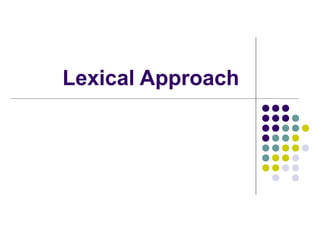Signaler
Partager

Recommandé
Contenu connexe
Tendances
Tendances (20)
Teaching Vocabulary To Advanced Students: A Lexical Approach

Teaching Vocabulary To Advanced Students: A Lexical Approach
Lexical Ambiguity and its types in Pashto Language

Lexical Ambiguity and its types in Pashto Language
En vedette
En vedette (8)
Similaire à Lexical approach
Investigating the Difficulties Faced by Iraqi EFL Learners in Using Light Verbs
Zahraa Adnan Fadhil Al-Murib,
Department of English, College of Education, Islamic University, Babylon, Iraq
This study deals with light verb constructions as being syntactically functional and semantically bleached. It aims at investigating the difficulties faced by Iraqi EFL Learners (fourth-year university students) in recognizing and producing this kind of constructions. Thus, to achieve this aim, it is hypothesized that Iraqi EFL Learners are unable to collocate the light verb with its proper noun phrase both at the recognition and the production levels. And in order to achieve the aim of the study and examine its hypothesis, the following procedures are adopted: (1) Presenting a theoretical background about light verb constructions including their definition, structure, and their relationship with collocations, (2) Designing a diagnostic test to investigate the difficulties that might face the learners while being exposed to these constructions, (3) Analyzing the findings of the test to reveal the learner’s recognition and performance in dealing with light verb constructions.
Keywords: Light Verb Constructions, Collocations, Difficulties
The Sixth International Conference on Languages, Linguistics, Translation and Literature
9-10 October 2021 , Ahwaz
For more information, please visit the conference website:
WWW.LLLD.IR
Investigating the Difficulties Faced by Iraqi EFL Learners in Using Light Ve...

Investigating the Difficulties Faced by Iraqi EFL Learners in Using Light Ve...The Annual International Conference on Languages, Linguistics, Translation and Literature
Similaire à Lexical approach (20)
Dialnet words aslexicalunitsinlearningteachingvocabulary-2579878

Dialnet words aslexicalunitsinlearningteachingvocabulary-2579878
Investigating the Difficulties Faced by Iraqi EFL Learners in Using Light Ve...

Investigating the Difficulties Faced by Iraqi EFL Learners in Using Light Ve...
A Contrastive Analysis of Urdu and English deixis.

A Contrastive Analysis of Urdu and English deixis.
Lexical approach
- 2. 'Lexical chunk' 'Lexical chunk' is an umbrella term which includes all the other terms. We define a lexical chunk as any pair or group of words which is commonly found together, or in close proximity.
- 3. 'Collocation' 'Collocation' is also included in the term 'lexical chunk', but we refer to it separately from time to time, so we define it as a pair of lexical content words commonly found together. Following this definition, 'basic' + 'principles' is a collocation, but 'look' + 'at' is not because it combines a lexical content word and a grammar function word. Identifying chunks and collocations is often a question of intuition, unless you have access to a corpus.
- 4. Lexical Chunks (that are not collocations) by the way up to now upside down If I were you a long way off out of my mind
- 5. Lexical Chunks (that are collocations) totally convinced strong accent terrible accident sense of humour sounds exciting brings good luck
- 6. A theory of learning According to Lewis (1997, 2000) native speakers carry a pool of hundreds of thousands, and possibly millions, of lexical chunks in their heads ready to draw upon in order to produce fluent, accurate and meaningful language. How then are the learners going to learn the lexical items they need?
- 7. Criticism : One of the criticisms levelled at the Lexical Approach is its lack of a detailed learning theory. It is worth noting, however, that Lewis (1993) argues the Lexical Approach is not a break with the Communicative Approach, but a development of it.
- 8. According to Lewis: Language is not learnt by learning individual sounds and structures and then combining them, but by an increasing ability to break down wholes into parts. Grammar is acquired by a process of observation, hypothesis and experiment. We can use whole phrases without understanding their constituent parts. Acquisition is accelerated by contact with a sympathetic interlocutor with a higher level of competence in the target language.